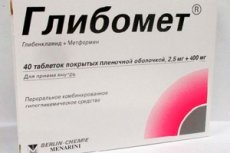該文的醫學專家
新出版物
甘草甜素
阿列克谢·克里文科,医学审稿人
最近審查:04.07.2025
最近審查:04.07.2025

格列本脲是一种复方药物,含有两种活性成分:格列本脲和盐酸二甲双胍。格列本脲属于磺酰脲类药物,通过刺激胰腺释放胰岛素来帮助降低血糖水平。盐酸二甲双胍属于双胍类药物,可减少肝脏葡萄糖生成,增强组织对胰岛素的敏感性,并改善葡萄糖吸收。格列本脲用于治疗2型糖尿病,尤其适用于格列本脲或二甲双胍单药治疗无效的患者。
適應症 甘丙美塔
Glibomet(格列本脲,盐酸二甲双胍)用于治疗成人2型糖尿病。其适应症包括饮食、运动和生活方式改变不足以有效控制血糖水平的患者。对于格列本脲或二甲双胍单药治疗后血糖仍未达到目标水平的患者,也可推荐使用这种复方药物。
發布表單
Glibomet 通常以口服片剂形式提供。
藥效學
格列本脲:
- 格列本脲属于磺酰脲类药物,是一种胰岛素促分泌剂。
- 格列本脲的作用机制是,它通过关闭胰腺β细胞中的钾通道,增加胰腺β细胞的胰岛素释放,从而导致膜去极化和随后的钙进入细胞,引起胰岛素释放。
- 格列本脲还能增加组织对胰岛素的敏感性。
盐酸二甲双胍:
- 二甲双胍是一种双胍类药物。其作用机制与减少肝脏葡萄糖生成和改善外周胰岛素敏感性有关。
- 它减少肠道对食物中葡萄糖的吸收,并增加肌肉对葡萄糖的利用。
综合效果:
- 格列本脲与二甲双胍的组合可以使2型糖尿病患者的血糖水平得到更全面、更均衡的控制。
- 这两种药物的组合可以通过刺激胰岛素分泌和提高组织对胰岛素的敏感性来降低血糖,以及减少食物中葡萄糖的吸收和减少肝脏中的葡萄糖生成。
藥代動力學
格列本脲:
- 吸收:口服后,格列本脲通常从胃肠道迅速、完全地吸收。
- 代谢:格列本脲在肝脏中代谢形成活性代谢物。它们也具有降血糖作用。
- 排泄:格列本脲及其代谢物主要通过尿液排泄。
- 作用时间:格列本脲作用时间约为12-24小时,因此通常每天服用一到两次。
盐酸二甲双胍:
- 吸收:盐酸二甲双胍一般从胃肠道吸收缓慢且不完全。
- 代谢:二甲双胍在体内几乎不代谢。它会以原形通过尿液排出。
- 排泄:约90%的二甲双胍以原形经肾脏排泄。
- 作用持续时间:二甲双胍通常持续约12小时,通常每天服用两到三次。
劑量和管理
使用方法:
- Glibomet 片剂通常口服,即通过嘴服用。
- 用少量水将它们整个吞下。
- 药片应在用餐时或用餐后立即服用。
剂量:
- Glibomet的剂量由医生决定,并可能根据患者的个人需求和疾病的特点而有所不同。
- 成人的通常起始剂量是每天服用一片含有格列本脲和二甲双胍的药片,一次或两次。
- 根据患者的血糖水平,可以根据医生的建议改变剂量。
入院时长:
- 服用 Glibomet 的持续时间通常由医生根据糖尿病的性质和严重程度决定。
- 通常需要长期服用该药物来控制血糖水平。
在懷孕期間使用 甘丙美塔
孕期服用格列本脲和二甲双胍(Glibomet)合用存在多种潜在风险,需要谨慎的医疗监督。以下是基于研究的一些要点:
- 二甲双胍:妊娠期使用二甲双胍被认为相对安全,可作为胰岛素的替代品用于治疗妊娠期糖尿病 (GDM)。二甲双胍不会导致出生缺陷,并可能降低流产、先兆子痫以及随后发生妊娠期糖尿病的风险。然而,约 46% 服用二甲双胍的女性可能需要加用胰岛素才能控制血糖 (Holt & Lambert, 2014)。
- 格列本脲:可有效降低妊娠期糖尿病患者的血糖,且与二甲双胍相比,其治疗失败率可能更低。然而,使用该药物可能增加先兆子痫、新生儿黄疸、延长新生儿重症监护病房住院时间、巨大儿和新生儿低血糖的风险 (Holt & Lambert, 2014)。
需要注意的是,口服降糖药在子宫内的长期影响尚未得到充分研究,需要进一步研究来评估其安全性和有效性。妊娠期使用格列美(Glibomet)应在与主治医生仔细讨论后进行,主治医生可以评估所有潜在风险和益处。
禁忌
- 过敏症:已知对格列本脲、二甲双胍或该药物的任何成分过敏的人不应服用 Glibomet。
- 1 型糖尿病:不建议使用 Glibomet 治疗以胰岛素绝对缺乏为特征的 1 型糖尿病。
- 降血糖药:服用某些降血糖药或胰岛素的患者可能禁用格列本脲,尤其是当这可能导致低血糖时。
- 肝功能衰竭:对于严重肝功能衰竭患者,应谨慎并在医疗监督下使用 Glibomet,因为药物代谢的变化可能需要调整剂量。
- 怀孕和哺乳:关于格列本脲和二甲双胍在怀孕和哺乳期间的安全性的数据有限,因此在此期间使用它们只能在医生的建议下进行。
- 儿科人群:Glibomet 对儿童的疗效和安全性尚未确定,因此儿童使用时可能需要咨询医生。
- 老年人:老年患者使用 Glibomet 时可能需要更谨慎的管理和定期监测。
副作用 甘丙美塔
- 低血糖症(低血糖),尤其是服用不当或与其他抗糖尿病药物一起服用时。
- 胃肠道疾病,如恶心、呕吐、腹泻、便秘。
- 尿道功能障碍(排尿问题)。
- 嘴里有金属味。
- 血液中乳酸水平升高(乳酸性酸中毒),尤其是在肾功能受损的患者中。
- 血液中尿素和肌酐水平升高。
- 过敏反应,如皮疹、瘙痒、荨麻疹。
- 对阳光的敏感度增加(光敏性)。
過量
- 低血糖症:这是磺酰脲类药物(包括格列本脲)过量服用最严重、最常见的副作用。症状可能包括饥饿、震颤、意识丧失、心律不齐、神经紧张,甚至癫痫。
- 酸依赖性代谢性酸中毒:这是二甲双胍过量服用的一个潜在危险并发症。症状包括严重且快速的呼吸衰竭、嗜睡、虚弱、腹痛和呕吐。
- 其他副作用:可能包括头痛、头晕、恶心、呕吐、腹泻以及心脏和中枢神经系统功能的各种紊乱。
與其他藥物的相互作用
增加降血糖作用的药物:
- 降低血糖水平的药物(例如胰岛素、其他磺酰脲类衍生物)可能会增强格列本脲的降血糖作用。这可能导致低血糖症。
- 其他抗糖尿病药物或含有α-葡萄糖苷酶的药物等降低血糖水平的药物也可能增强格列本脲的降血糖作用。
增加乳酸酸中毒风险的药物:
- 可能增加发生乳酸性酸中毒风险的药物,如某些抗生素(例如大环内酯类)、某些X射线造影剂或酒精,可能会增加二甲双胍的副作用,如代谢性酸中毒。
影响肾功能的药物:
- 由于二甲双胍主要通过肾脏排泄,因此影响肾功能的药物(例如某些非甾体抗炎药 (NSAID) 或利尿剂)可能会增加二甲双胍在体内积聚的风险并增加其副作用。
影响肝功能的药物:
- 由于格列本脲在肝脏中代谢,影响肝功能的药物(例如肝酶的抑制剂或诱导剂)可能会改变其药代动力学。
影响消化道的药物:
- 一些药物,例如抗酸药,可能会减缓或减少二甲双胍从胃肠道的吸收。
注意!
為了簡化對信息的理解,本指令使用了藥物 "甘草甜素",並根據藥物的醫療用途官方說明。 使用前請閱讀直接用於藥物的註釋。
描述僅供參考,不適用於自我修復指導。 這種藥物的需求,治療方案的目的,藥物的方法和劑量僅由主治醫師確定。 自我藥療對你的健康有危害。


